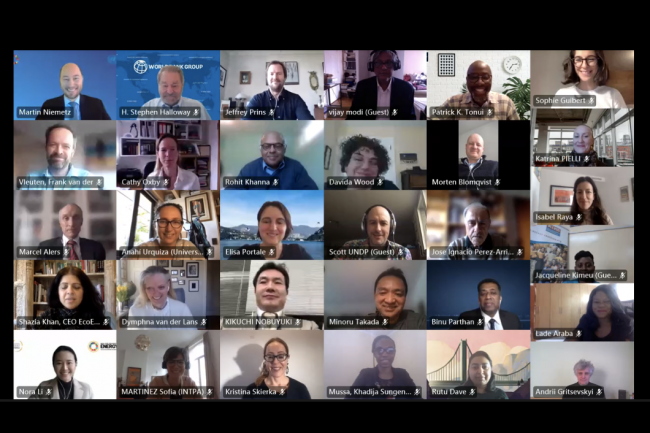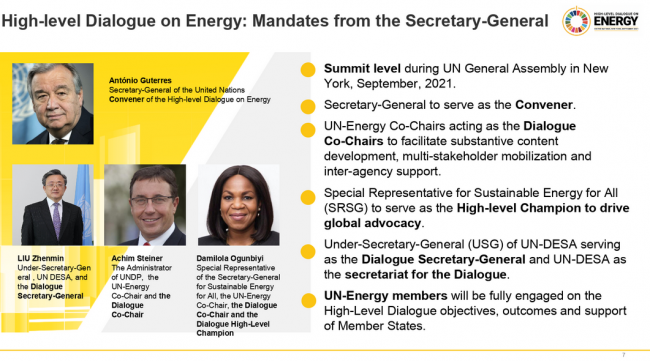The first meeting of the Technical Working Group on Energy Access focused its discussion on how to accelerate electrification and clean cooking. The Working Group is one of five groups that are preparing recommendations to be presented to the High-Level Dialogue on Energy, which will be convened by the UN General Assembly (UNGA) in September 2021.
Opening Statements
Damilola Ogunbiyi, Special Representative of the UN Secretary-General for Sustainable Energy for All, Co-Chair of UN-Energy, and Co-Chair of the High-level Dialogue on Energy, welcomed the 92 participants to the online dialogue. She recalled the historic importance of the High-Level Dialogue on Energy, noting that it will be the first meeting of Heads of State and Government under UNGA auspices to address the global energy agenda since 1981. She emphasized that if we do not achieve Sustainable Development Goal 7 (clean and accessible energy) by 2030, we will not achieve the Paris Agreement on climate change objective to have net-zero emissions by 2050.
Representatives from two of the three co-lead agencies for the Technical Working Group on Energy Access introduced the themes the Technical Working Group will consider. Heidi Schroderus-Fox, Director, UN Office of the High Representative for the Least Developed Countries, Landlocked Developing Countries and Small Island Developing States (UN-OHRLLS), highlighted challenges related to the objective to accelerate access to safe, clean, and affordable energy for all. Marcel Alers, Global Head of Energy, United Nations Development Programme (UNDP), said challenges of energy access are not only issues of finance or technology; they also stem from business models, economic models, politics, history, education, and culture. A representative from the third co-lead agency—Rohit Khanna, ESMAP (Energy Sector Management Assistance Program) Manager, World Bank—offered a summary of the discussion at the close of the meeting.
Minoru Takada, Team Leader, Secretariat of the High-level Dialogue on Energy, UN Department of Economic and Social Affairs (DESA), reviewed the preparatory process and leadership for the High-Level Dialogue on Energy. The event will be convened by the UN Secretary-General at the summit level during the UN General Assembly in September 2021. UN-Energy’s Co-Chairs are serving as the Dialogue Co-Chairs, the Special Representative for Sustainable Energy for All is the High-level Champion to drive global advocacy, the Under-Secretary-General of DESA is serving as the Dialogue Secretary-General, and DESA is serving as the secretariat for the Dialogue.
Open Discussion
During the open discussion, Technical Working Group Members, Member State Global Theme Champions, and UN-Energy Member Organizations offered suggestions for focus areas and priorities for the recommendations the Working Group will develop.
Speakers noted that universal energy access will require efforts to expand the existing electric grid and develop mini-grids and off-grid options. Many also said top-down planning should be complemented by a bottom-up customer focus, starting with the needs of end users to ensure a service-level orientation and including those who ultimately pay for energy services in the planning. Others suggested moving beyond a focus on energy access to consider how to improve reliability.
Several speakers said the fact that many people lack access to energy needs to be framed as an unacceptable problem. One speaker suggested developing case studies about expanding energy access. Another speaker suggested exploring models for stakeholder engagement at the national level.
A number of speakers highlighted the need to create new business models. A role for “pilot” and “pioneer” actions was noted. Another speaker added that we need to adjust our mental models for what is meant by scaling up, and to move from thinking about replications of pilot projects in groups of 10s to groups of 100s or 1000s. Some highlighted the need to consider the role of regulatory business models as well as the role of regional power trading as an option to increase supply in some areas.
The need for resources, from concessional finance to philanthropic funds, was highlighted. One speaker noted that a starting point for action is for governments to move away from fossil fuel subsidies. Participants also discussed a need for “smart subsidies” to ensure no one is left behind.
The importance of a gender lens was stressed by many participants. The perspectives of, and contributions from, children and youth were also highlighted as important for achieving a clean energy transition.
On the implications from the COVID-19 pandemic, participants noted how it has both introduced additional challenges and increased the urgency for achieving universal energy access. The Group was asked to consider what the energy access agenda would be in the context of post-pandemic job creation.
Speakers discussed the importance of learning and capacity building. One said national electrification plans need to be dynamic and updated, which requires ministry officials to be trained and to be able to correctly estimate energy demand. A role for universities and students in exploring new issues and models was highlighted as a way to develop solutions to existing challenges.
Many speakers discussed a role for data in achieving universal energy access. They noted that it should be used to increase the efficiency of energy use. A speaker suggested building utilities’ capacity to use data they already collect. Another speaker said financing for energy access should include equity metrics.
Speakers emphasized the need to focus on “last mile” efforts needed to ensure that no one is left behind. They discussed the need to consider this issue from the perspective of the hardest groups to reach, and to focus on adding value for those living off the grid and to involve users in the search for solutions.
Linkages with other agendas and meetings were noted, including the SAMOA Pathway, the High-level Political Forum on Sustainable Development, and the COP 26 Energy Transition Council.
With regard to clean cooking and cook stoves, the use of natural gas for cooking and heating was noted, and participants were asked to consider what they would recommend for these sectors, especially in poorer countries. A speaker called for plans based on country-specific needs. Another speaker highlighted the opportunity to have global leaders call for action on this issue.
Conclusion and Next Steps
Rohit Khanna, ESMAP Manager, World Bank, highlighted that the High-Level Dialogue on Energy represents a generational opportunity to build political momentum for the energy access agenda. He pointed out that the preparatory process provides an opportunity for participants to learn from one another as well as to define the roadmap for achieving the 2030 and 2050 goals. He also noted that countries will need to pursue unique paths, adding that everything the group does should take into consideration the importance of advancing gender equality.
Members of the Technical Working Group on Energy Access were asked to submit written inputs by 4 March 2021. Based on these comments, the Co-Chairs will share an annotated outline by 11 March. Comments on the outline should be submitted by 18 March. The first draft of the report will be available the week of 12 April. The second meeting of the Group will take place the week of 18 April. The Group will have its final meeting the week of 10 May.
The first meeting of the Technical Working Group on Energy Access convened virtually on Wednesday, 24 February 2021, from 8:00 to 10:50 am EST (GMT-5).
To receive continuing coverage of this event delivered to your inbox, subscribe to the ENB Update newsletter.










